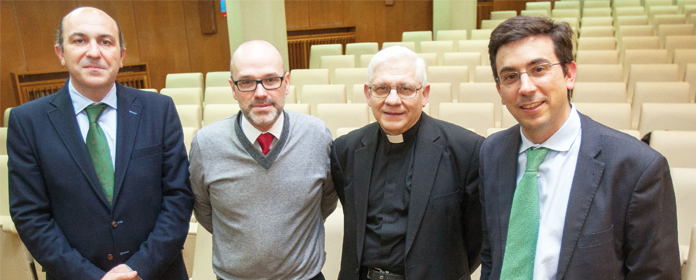Ignacio Ferrero: "El comportamiento económico que se rige por la maximización del beneficio no es suficiente"
El decano de la Facultad de Económicas ahonda en las implicaciones de ‘Laudato si' con los profesores Domènec Melé (IESE) y Antonio Moreno

"La reflexión ética sobre el mercado nos debe llevar a replantearnos que el modelo de comportamiento económico que se rige por la búsqueda de la maximización del beneficio no es suficiente, hay que ampliar el enfoque", ha defendido Ignacio Ferrero, decano de la Facultad de Económicas de la Universidad de Navarra.
El experto en ética empresarial ha participado en la mesa redonda Economía y desarrollo sostenible, enmarcada en la jornada de diálogo interfacultativo en torno a la encíclica Laudato si, organizada por la Universidad de Navarra. Ferrero ha compartido ponencias con el profesor emérito del Departamento de Ética Empresarial y titular de la Cátedra de Ética Empresarial del IESE, Domènec Melé, y con Antonio Moreno, profesor de la Facultad de Económicas. Ha moderado el diálogo el director del Departamento de Economía, José Luis Álvarez Arce.
Ferrero ha defendido que la doctrina social de la Iglesia "tiene un importante papel, ya que ha difundido una y otra vez la visión del ser humano como un ser esencialmente vinculado a los demás y cuyo destino se juega simultáneamente con el destino de los otros". Un principio especialmente importante en este contexto es el del destino universal de los bienes: "Sobre toda propiedad privada grava siempre una hipoteca social, para que los bienes sirvan a la destinación general que Dios les ha dado", ha subrayado.
Frente a otras interpretaciones, Ferrero ha defendido que el libre mercado "es la solución y no el problema, porque es la única forma conocida de organizar la actividad económica que respeta la libertad y la dignidad humana".
El cambio climático en la agenda política mundialAntonio Moreno ha abundado en el razonamiento, y ha explicado que Laudato si "supone un paso adelante en la antropología cristiana en la práctica. Francisco propone una nueva cultura ecológica que reconcilie al hombre con la naturaleza y el medio ambiente". Una "revolución cultural, ética y moral para salvar y amar la naturaleza". De acuerdo a las tesis defendidas por el profesor, "la Economía y los mercados tienen el potencial de ayudar en la reconciliación entre el hombre y el medio ambiente, pero no resuelven por sí solos muchos de los problemas medioambientales. Ni se puede dejar todo a los mercados, ni tampoco al Estado. La sociedad civil, los políticos, los empresarios y las familias han de remar todos en la misma dirección. Esto facilitaría la adhesión de los distintos países a los acuerdos medioambientales, como el de París (2015)".
Pese a la evidencia empírica del razonamiento, Moreno reconoce que los gobernantes "pueden ver el objetivo de crecimiento económico como yuxtapuesto al desarrollo sostenible". Por eso, "conciliar ambos debería estar más arriba en la agenda política, por ejemplo a través de la promoción de trabajos intensivos en sectores tecnológicos favorables al medio ambiente. De este modo, se crearía un círculo virtuoso necesario para la economía mundial", ha explicado.




